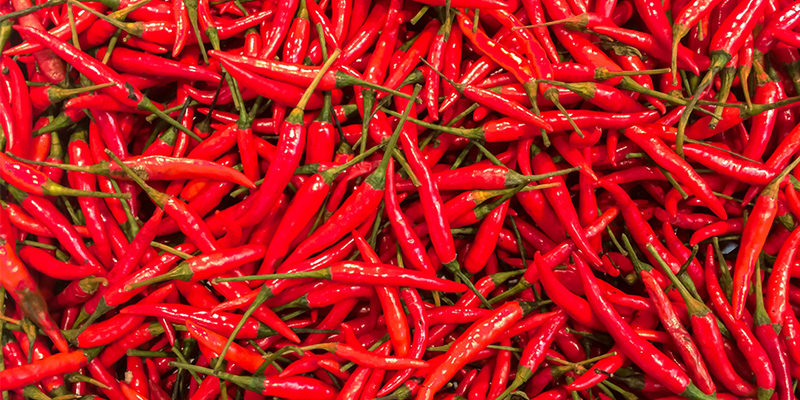Memory warning to those wanting to spice up their lives
By Candy Gibson
 HEALTH Chilli consumption has been found to be beneficial for body weight and blood pressure in previous studies but researchers have also found adverse effects on cognition among older adults.
HEALTH Chilli consumption has been found to be beneficial for body weight and blood pressure in previous studies but researchers have also found adverse effects on cognition among older adults.Think twice before adding that extra kick of chilli sauce or chopped jalapeno to your meal. New research involving UniSA shows a spicy diet could be linked to dementia.
A 15-year study of 4582 Chinese adults aged over 55 found evidence of faster cognitive decline in those who consistently ate more than 50 grams of chilli a day. Memory decline was even more significant if the chilli lovers were slim. Fifty grams of chilli is equivalent to about three to four tablespoons of dried chilli peppers.
The study, led by Dr Zumin Shi from Qatar University, showed that those who consumed in excess of 50 grams of chilli a day had almost double the risk of memory decline and poor cognition.
“Chilli consumption was found to be beneficial for body weight and blood pressure in our previous studies. However, in this study, we found adverse effects on cognition among older adults,” Dr Zumin says.
UniSA epidemiologist Dr Ming Li, one of five researchers involved in the study, says chilli intake included both fresh and dried chilli peppers but not sweet capsicum or black pepper.
“Chilli is one of the most commonly used spices in the world and particularly popular in Asia compared to European countries,” Dr Li says. “In certain regions of China, such as Sichuan and Hunan, almost one in three adults consume spicy food every day.”
Capsaicin is the active component in chilli which reportedly speeds up metabolism, fat loss and inhibits vascular disorders but this is the first longitudinal study to investigate the association between chilli intake and cognitive function.
Those who ate a lot of chilli had a lower income and body mass index (BMI) and were more physically active compared to non-consumers. Researchers say people of normal body weight may be more sensitive to chilli intake than overweight people, hence the impact on memory and weight. Education levels may also play a role in cognitive decline and this link requires further research.
Consumption of more than 50g of chilli a day is not common in Western countries. However, among study participants, the median portion size of chili intake was 50g; and about 30 per cent of chilli consumers had chili intake above 50g per day.
The China Health and Nutrition Survey (CHNS) is an ongoing household-based cohort study conducted in nine provinces in China between 1989 and 2011. Cognitive screen tests were conducted among those aged 55 and above in regular intervals between 1991 to 2006. The participants were asked to recall a 10-word list, counting backwards from 20 and doing some basic subtractions.
It is estimated that dementia affects about 50 million people globally. In 2017, approximately 9.5 million Chinese adults aged 60 years and above had dementia.
The paper, High chilli intake and cognitive function among 4582 adults is published in Nutrients.
Other Stories
- A midnight snack might be the key to working overnight
- Memory warning to those wanting to spice up their lives
- Study indicates causal link between obesity and multiple diseases
- Dragonflies are helping make driverless cars safer
- From the Vice Chancellor
- Achievements and Announcements
- Sixteen images that will change how you view research
- Technology preventing hospital falls explained through animation
- Refurbished spaces for Aboriginal students open at City East and Magill
- Healthy lifestyle may counteract genetic risk of dementia
- Video: See highlights from the first six months of 2019
- UniSA visual artist represented on world stage at Cairo Biennale
- Students and staff to provide a ‘hand up’ to help the homeless
- The latest books from UniSA researchers
- UniNationals and Crows lunch




